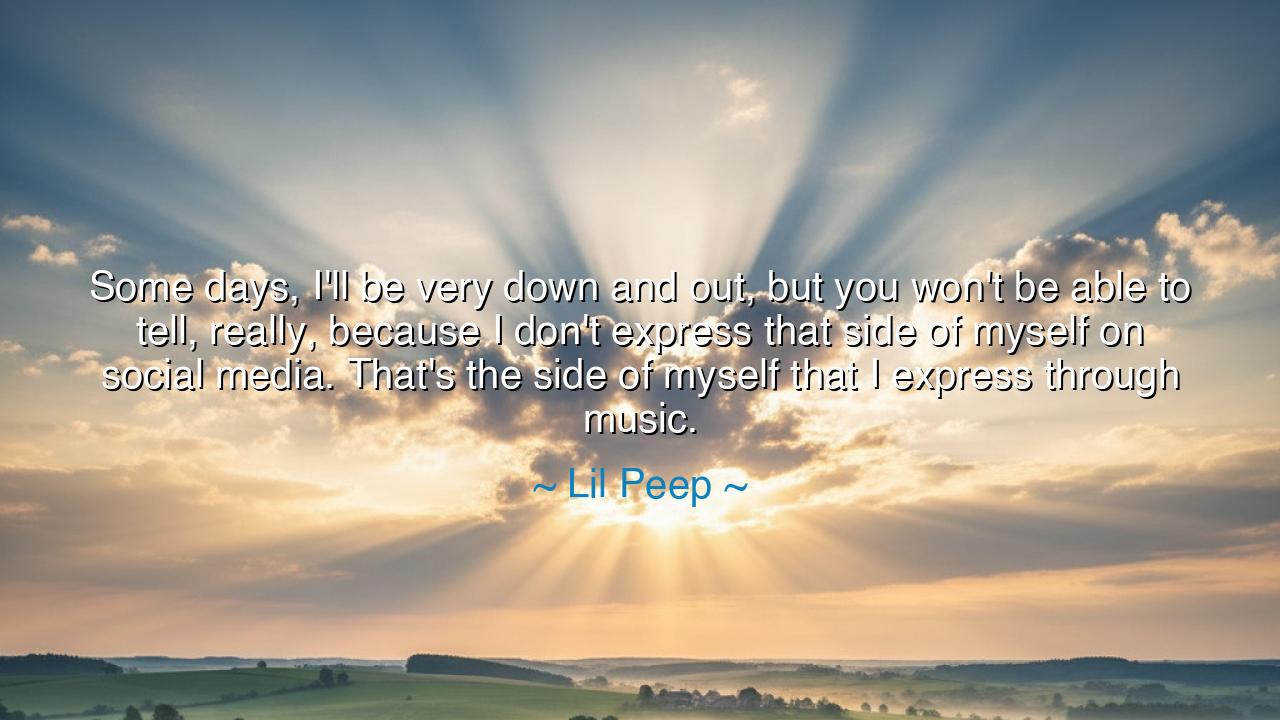
Some days, I'll be very down and out, but you won't be able to
Some days, I'll be very down and out, but you won't be able to tell, really, because I don't express that side of myself on social media. That's the side of myself that I express through music.






The young and troubled artist Lil Peep, whose voice became the echo of a generation lost between pain and hope, once confessed with piercing honesty: “Some days, I’ll be very down and out, but you won’t be able to tell, really, because I don’t express that side of myself on social media. That’s the side of myself that I express through music.” In these words, we glimpse not only the heart of a single artist, but the eternal struggle of humanity—to hide its wounds before the world, yet pour them into art where they can live, breathe, and be understood.
To say “down and out” is to admit to the heaviness of sorrow, the invisible storms that rage within the soul. Many in this age of curated images and shining screens will never show their wounds openly, for the world is quick to consume appearances but slow to embrace pain. Thus, social media becomes a mask, a stage where only the bright face is shown, while the shadows remain hidden. But for Lil Peep, the shadows did not remain silent; they found voice in the one realm where honesty could flow—his music.
In this confession, we see the true purpose of art. It is not only for celebration, but for survival. Music became his vessel of truth, the altar upon which he laid his grief, loneliness, and longing. While the world scrolled past his smiling images, those who listened to his songs heard the cry beneath the mask. And in hearing, they recognized themselves. For the power of music is that it transforms private anguish into shared understanding, turning isolation into communion.
History speaks of others who bore this same burden. Billie Holiday, in her song Strange Fruit, did not mask the horror of racial violence; she poured it into music, giving voice to the unspoken pain of millions. Kurt Cobain, another prophet of youth in despair, rarely revealed his torment in conversation, but his lyrics carried the raw truth of his soul, touching those who felt unseen. Like them, Lil Peep discovered that music can bear what the human face cannot show—that melody can carry grief more faithfully than words on a screen.
And yet, there is tragedy in this wisdom. For while music allows truth to flow, the world often fails to see the depth of the pain behind it until the artist is gone. Lil Peep’s early death stands as a testament to the fragility of those who carry the sorrow of many. His quote is both revelation and warning: do not assume that a smile means peace, nor that silence means absence of pain. There are oceans behind quiet eyes, and sometimes only in art are they revealed.
The lesson here is twofold. First, for those who suffer: know that it is not weakness to seek an outlet. Like Lil Peep, find a way to let the shadows speak—through music, writing, painting, or even the simple act of confiding in another. To express is to heal, to give form to what would otherwise consume. Second, for those who listen: honor the art you encounter, for it may be the truest cry of a soul that hides its pain elsewhere. Do not dismiss the voice in the song—it may be the voice that needs your compassion.
Practically, this means: listen deeply to the art around you, and listen deeply to the people in your life. Do not be fooled by the perfection of appearances, for every person fights unseen battles. Encourage honesty, create safe spaces for expression, and remember that even the strongest masks hide fragility. And for yourself, let art—whether you create it or embrace it—be the sanctuary where your truest feelings may live.
So let Lil Peep’s words echo as a teaching for generations: what we do not show in the light of day may yet be sung in the quiet of night. Music is not mere entertainment—it is confession, catharsis, and communion. Honor it, and honor those who pour their hidden selves into it. For in their songs, we find not only their pain, but the reflection of our own—and in that recognition, the beginning of healing.






AAdministratorAdministrator
Welcome, honored guests. Please leave a comment, we will respond soon